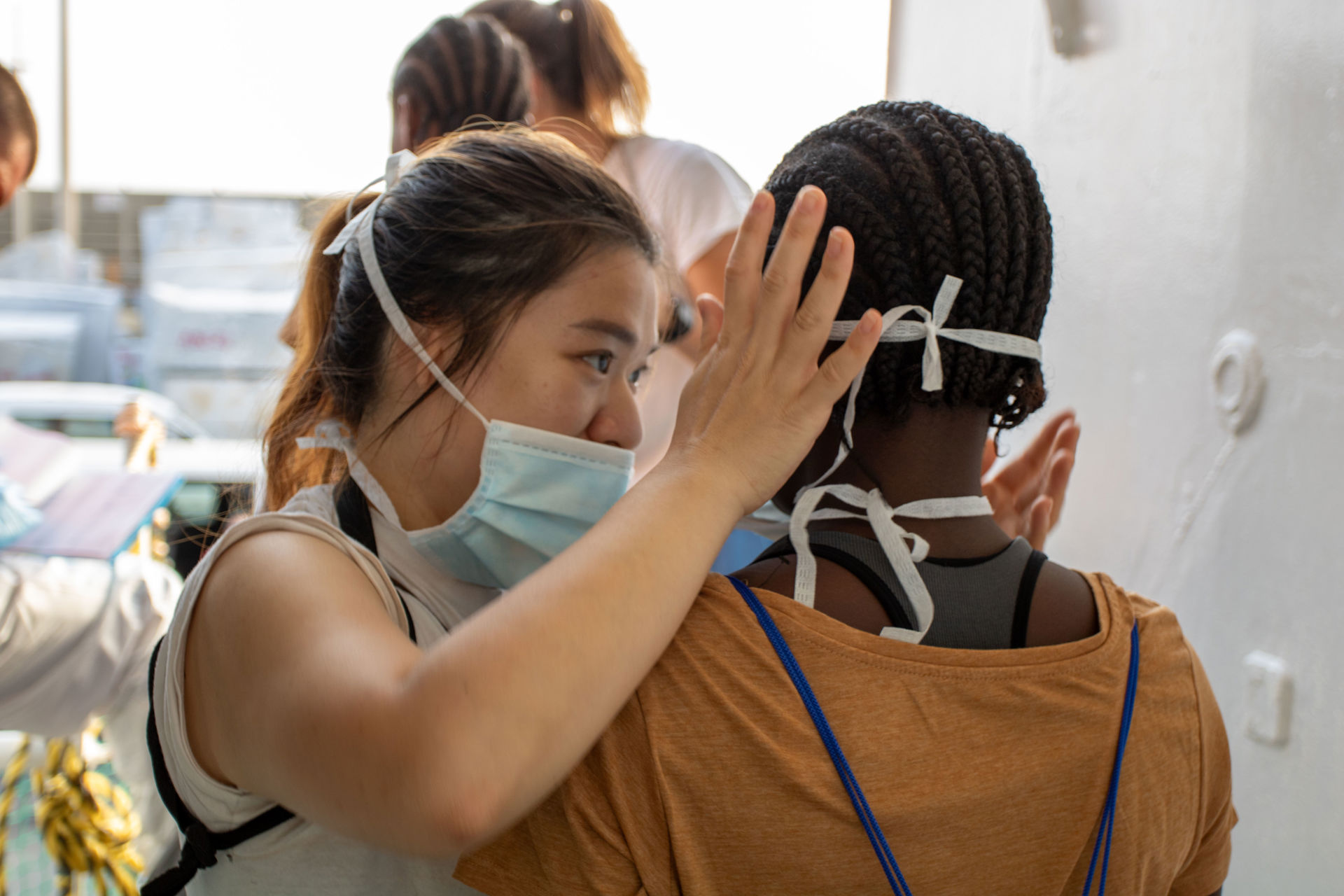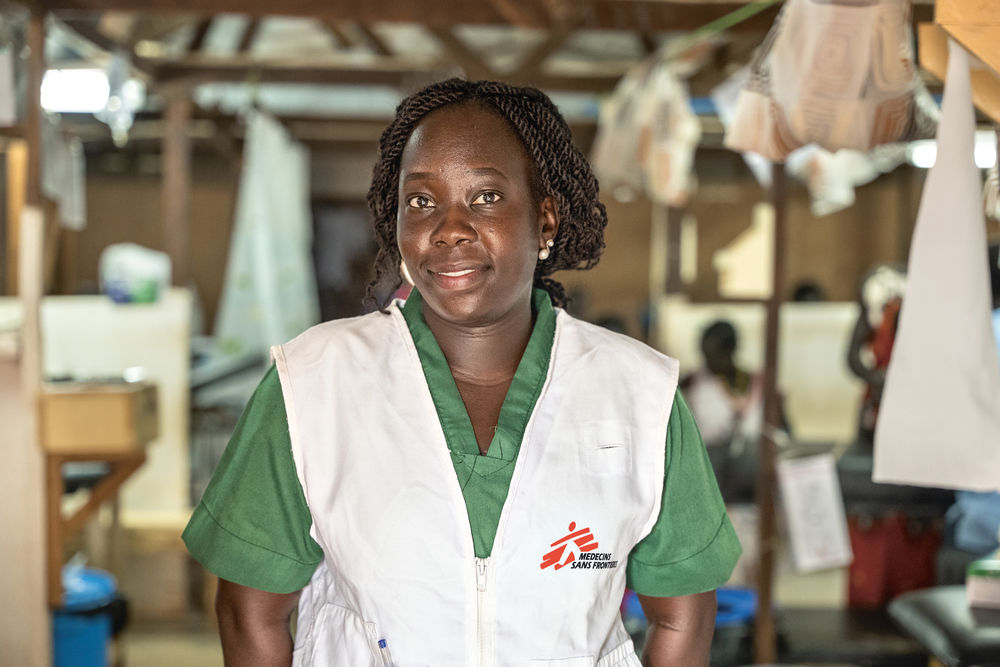Right after I returned to Hong Kong from a maritime search and rescue assignment, I talked about my hopes and dreams with my friends. I dream of world peace. Some of my friends jokingly said their dreams were very ordinary and small in comparison. But I remembered that back then, on the other side of the world, some people's dreams were so simple that many people would hardly count them as dreams. For many people on the move, what they pursued all their lives – often at the risk of losing their lives – was to have a peaceful night’s sleep.
The assignment was in the central Mediterranean Sea, working aboard the MSF search and rescue vessel, Geo Barents. I was a midwife on board. It was a challenging assignment because for the first time in my life I had to live at sea for a sustained period of time. And I was handling multiple job functions.
As the elderly says: "Waters are more dangerous than mountains" – these really are words of wisdom. If anything goes wrong at sea, your call for help may well not get answered in time. That’s why we had to repeatedly test, train, rehearse and plan so that we could perform every task well and minimise the risks.
On the boat, we had no formal days off. The whole team was on call 24 hours a day, and a lot of the time we had to do overnight shifts. Our work and training didn’t only focus on medical care, there was also safety knowledge and measures at sea, including lookout for boat in distress and maritime communication. Everyone needed to know how to look for ships with people seeking safety and protection in, many as small as banana boats or dragon boats in the vast ocean. We took turns to look for them with binoculars in Geo Barents’ bridge, day and night. As the medical team, in addition to treating survivors' various illnesses, we also had to deal with many emergencies, such as people inhaling water and serious injuries.
As the midwife on board, I was responsible for the sexual and reproductive health clinic, taking care of the female and infant survivors. Another important component of my work was to provide care for survivors of violence, including sexual and gender-based violence.
Before the assignment, many colleagues with more experience told me that this one would be very difficult and arduous, not only because of the heavy work, and also because I had to rapidly adapt to the life on board. But the hardest part was the survivors' heart-wrenching stories.
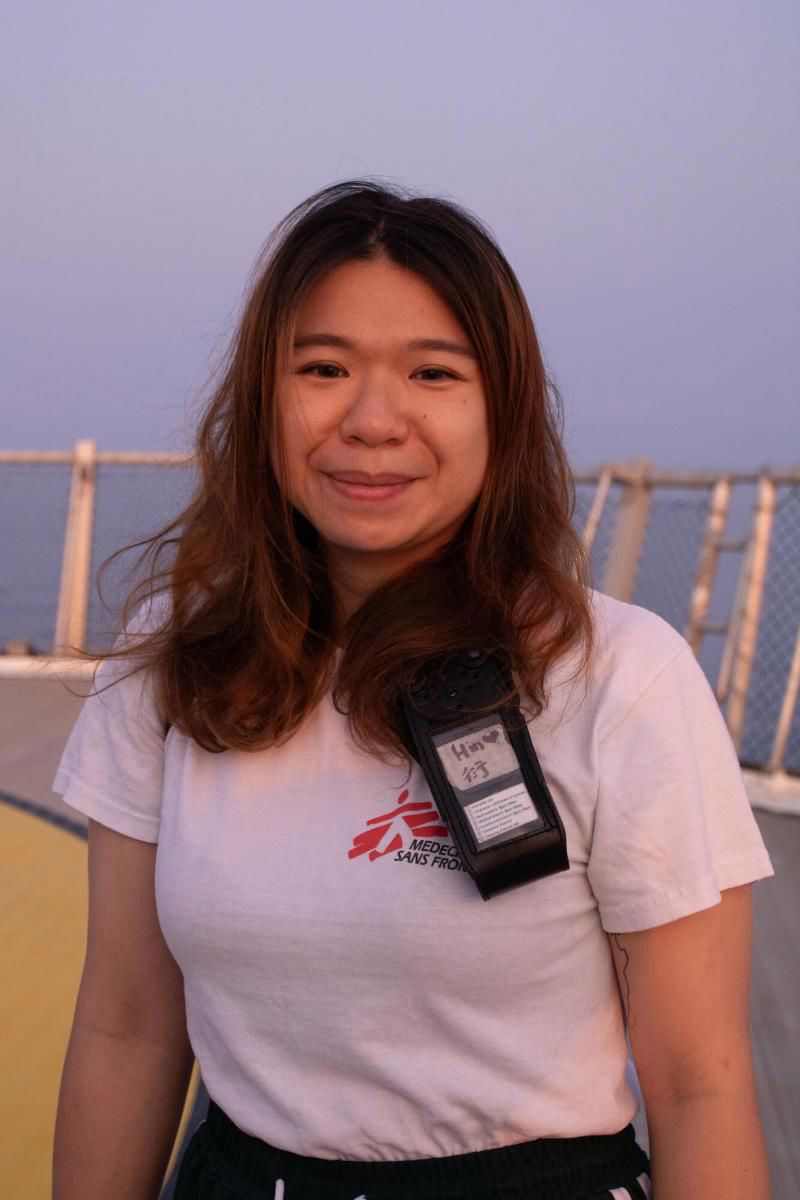
For easier communication, Krystal asked people to call her "Hin", the middle character of her Chinese name (as written on the walkie-talkie) on the vessel. And to many teenage survivors on Geo Barents, she was the "Mama Hin" that shared knowledge on sexual and reproductive health with them. © Michela Rizzotti/MSF
The shapes of the scars
This job can be stressful and upsetting sometimes, because one of our main duties was to care for scars and wounds.
In most of the search and rescue operations, the survivors had been drifting in the Mediterranean for hours, sometimes for days. And before they got on board the boats, they experienced warfare, extreme violence, poverty, abuse, sexual violence, hunger. So there were many people with wounds and illnesses of varying severity.
I still remember vividly in one rotation, we hit really bad weather. The ship was tossed up by two to three-metre-high waves. Most of us felt pretty uncomfortable, but we all had to stick to our posts, because ships in distress and survivors could be found anytime.
Despite working hard around the clock to patrol the sea for several days, what we found repeatedly were empty ships or even wreckage. Many more lives who have likely been lost at sea.
After almost a week of working without noticing whether it was day or night, all our team members were exhausted. Waves constantly hit our ship and we were kept busy cleaning up while patrolling. Some team members were so seasick that they couldn't get out of bed. Daily activities like lying in bed, going to the loo, eating and drinking, and even walking were remarkably difficult, because everything, including us, would be tossed up and down all the time. The ship even tipped occasionally, throwing people out of bed as they slept.
We didn’t want to give up even with that extreme weather. The Mediterranean was as tough as a furious tiger, while the small migrant boats were just like little rabbits that could be swallowed up at any time.
Our persistence somehow paid off - we found a boat with people alive in it later on! For me, that rescue operation was unforgettable. We safely moved the survivors to the Geo Barents.
Because the weather at sea had been so bad, they couldn't help expressing their joy and sense of relief after getting on board. Some even knelt and kissed the floor. Some children cried when they saw seawater coming over the sides of even our big boat, probably a post-traumatic reaction against the waves.
Every time survivors were rescued by us and brought on board, our medical team ran a range of clinics and treatment centres. Our clinic is set out in different cabins for survivors with different needs.
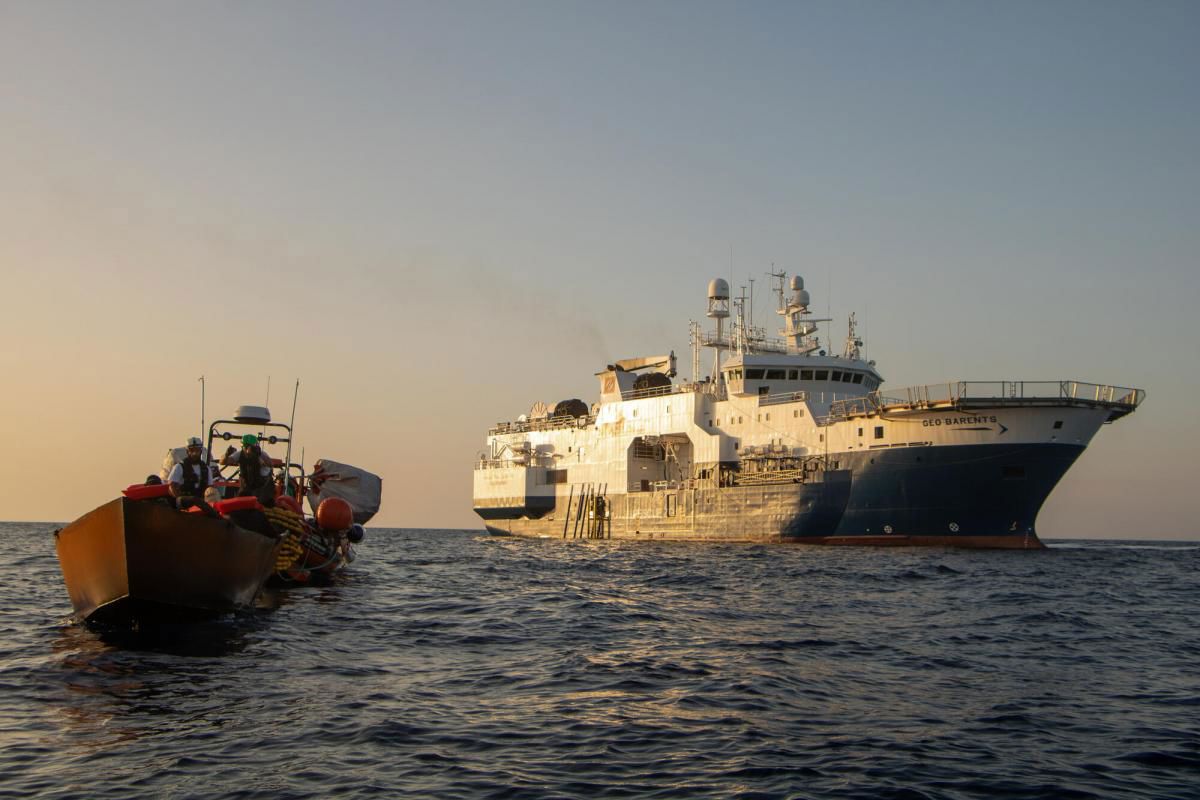 Geo Barents on a rescue mission saving people from distressed boats in the Maltese search and rescue zone in July 2023. © Stefan Pejovic/MSF
Geo Barents on a rescue mission saving people from distressed boats in the Maltese search and rescue zone in July 2023. © Stefan Pejovic/MSF
The “corner clinic” mainly treated wounds of various types and skin diseases. We saw many forms of scars. A lot of the survivors from Libya had straight and hardened scars, looking a bit like a centipede, which were caused by beatings with metal rods; some were thick and broad, caused by whipping; there were also small, grey spots caused by cigarette or fire burns. We saw lots of little red spots due to skin infections, and old scars of electrical burns…
One deck up, deeper inside our vessel, was the midwifery and sexual and gender-based violence clinic, where I often worked day and night.
During one of the rotations, a 17-year-old called Fatima* brought her little daughter to the clinic for a check-up. I found that she had small, short, horizontal scars, like a sketch on the inside of her left arm. After asking a series of questions, I discovered more and more horrific details of the saddest story:
Born in Nigeria, West Africa, Fatima used to live with her parents, but war completely changed her life. One night, she said an armed group broke into her home and shot her father dead in front of her. Her mother was gang-raped to death. Then they took her away as a (sex) slave for the squad. She was only 12 years old.
In many wars, it is not uncommon to see armies using sexual violence and kidnapping as weapons against the civilians.
One day Fatima managed to escape, but fell into another hell on earth. She was caught on the road and sent to a brothel as a sex worker. The scars on her hands were caused by her secret suicide attempts at that time. She also became pregnant and the men controlling her forced the child to undergo female genital mutilation.
Female genital mutilation/cutting (FGM/C), also known as "female circumcision", refers to the partial or total removal of the external female genitalia for non-medical reasons. It is a tradition in many parts of Africa. It is also a kind of sexual control of women and a sign of gender inequality – it is seen as a way to make women remain faithful to their husbands. The consequences include pain, infections, cysts, infertility, complications during delivery, fatal bleeding, and sometimes death. FGM/C also leaves a significant psychological scar.
Fatima had experienced it herself and had seen other girls die or feel they would rather be dead because of it. As a mother, she ran away again. But Fatima soon discovered that she had no real way of escape from everything she faced, so she decided to risk the lives of herself and her two-year-old girl to get on a boat and cross the Mediterranean.
I examined the child and found that she had wounds and infections on her vagina and mouth. The infections in her oral cavity and on her lips were caused by sexual assault.
I clenched my fists angrily and then tried hard to control my emotions while I treated the mother and daughter.
Waves that inflict psychological trauma
And there was another time that we worked until midnight, and suddenly there was a sound from my walkie-talkie. A colleague asking me for urgent help. It turned out that a lady called Asana* from Mali had suddenly passed out. She was quickly carried to the ship's hospital, where we examined her and gave her oxygen and medicine. She was fine. After resting for a while, she got up and we began talking about her past.
She and her sister were orphans. They were molested by their grandfather when they were very young. When she grew up, she was forced to marry a neighbour, who turned out to be a brutal husband. He often beat her and raped her. When her sister found out about it, she took Asana to run away from the village. But because the family of Asana’s husband had so much power in the village, the sisters felt they had no choice but to get to real safety by crossing the Mediterranean.
"It's a cruel twist of fate. Every time I see the big waves, I think of my sister. I miss her so much that it makes me short of breath." When Asana talked about her sister who was buried in the ocean, she became out of breath and cried hysterically. That’s what had made her pass out - extreme sadness.
With her consent, I referred her as a case of post-traumatic syndromes to the psychologist on board. And she asked me to examine her body. I found that her back and limbs were covered in scars, and the most disturbing fact was that her vagina had multiple wounds and ulcers. I believe she was repeatedly assaulted.
Every year, many people, like Asana’s sister, trying to escape from one hell fall into another. Many refugees and migrants trying to cross the Mediterranean have gone missing. In 2023, 3,105 people died or went missing in the Mediterranean Sea. And 2023, was the deadliest year in the Mediterranean since 2017. Women's lives are at greater risk during sea journeys. Most of them sit in the middle of the boat, where they are the first to be infected by seawater and suffer fuel burns. Traditionally they take care of the babies, and most of them wear long sleeved clothing. The clothes become even heavier when they get wet, making it even more difficult to escape a watery grave.
That night, I was drained physically and mentally. After finishing all the work, I was finally alone in the clinic. I couldn't help hiding my head on the desk to wail.
Sometimes, as a human being, I really feel outraged and in despair about the evil and cruel behaviors some humans are capable of. But it is exactly because of this that all people need to unite to fight against all kinds of brutality and sexual violence..
On the MSF rescue ship’s clinic, we treat survivors, take care of their wounds or symptoms, provide medication, carry out preventive vaccination and conduct various medical tests. We will also provide emergency contraception, prevention and treatment of AIDS and sexually transmitted diseases, family planning and psychological counselling. When needed, we also issue legally valid medical certificates to survivors, refer them to the health facilities and other aid agencies onshore.
In everything we do, we maintain absolute confidentiality and respect the will of the survivors. That’s about upholding the principle of being patient-centred in what we do.
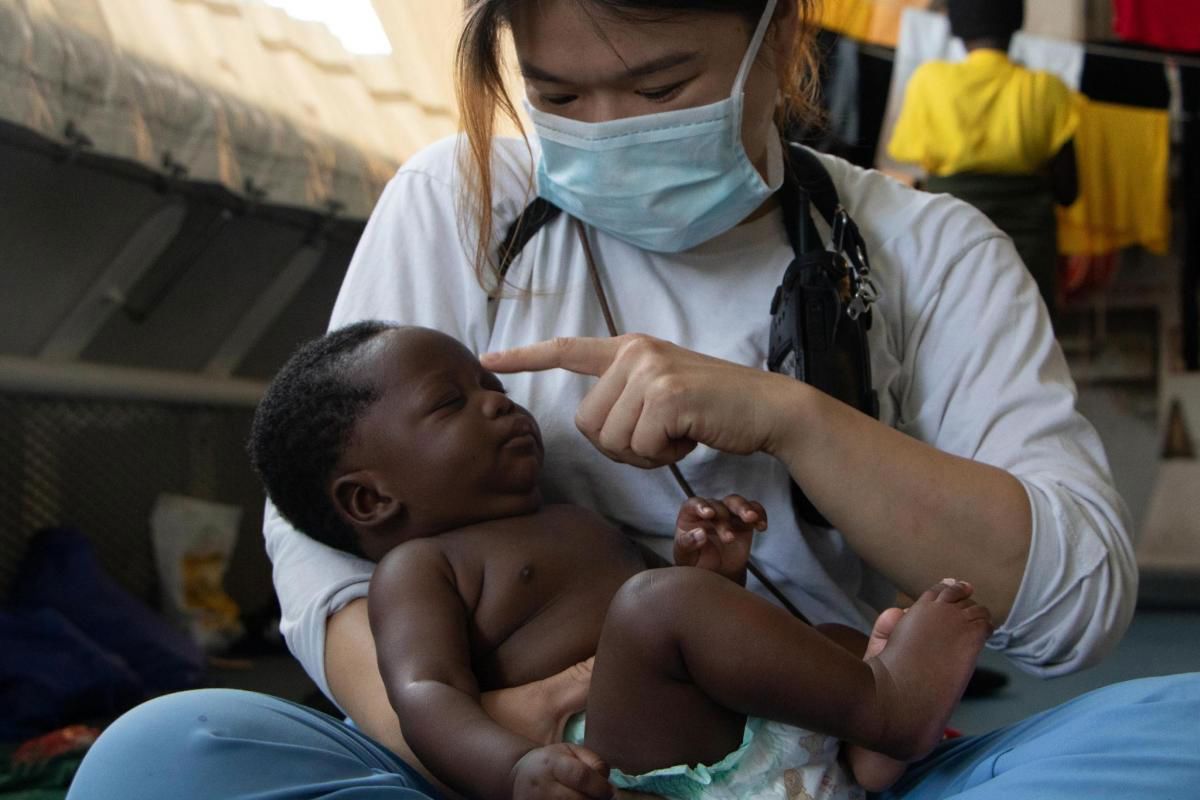 © Michela Rizzotti/MSF
© Michela Rizzotti/MSF
Hoping for just a peaceful night
During one rotation, someone knocked on the clinic door. It was a two-year-old little girl. The mother smiled and said her daughter missed me, then gave me a colorful painting. I asked her name and she said, "My name is Peace."
The mother who had experienced a lot of violence explained that peace is the thing she wishes for all the time. She wanted both of them to live a peaceful life and especially to have secure, tranquil nights. Nights where they didn’t suffer from abuse and fear, and where there was no need to hold a knife in one hand while holding her daughter in the other just to get to sleep. She thanked us repeatedly because she really felt calm and safe for the first time in her life on Geo Barents. She was able let down her guard and go soundly to sleep.
On a wall outside the clinic, there was a painting by the survivors, with flowers, tall trees, a blue sky and white clouds on it. We invited many of them to write their dreams or wishes on the painting. Most of them hoped they could go to school; some wished to go home to find their families and friends that they’d lost contact with; some hoped to find a safe place to live.
In the afternoon, we had a meeting where everyone could remember and mourn for the migrants who had lost their lives, including Asana’s sister. Seeing their tears, I wondered again what motivated them, gave them the courage to risk their lives and board those fragile migrant ships?
They entered the Mediterranean with a heavy past and sorrowful memories, but what gave them the greater strength and motivation were their hopes and dreams for the future.
On board we witnessed the resilience of these people pursuing dreams. Dreams, no matter how big or small, and regardless of our wealth, education level or culture, have the possibility of changing people’s lives. The life and dreams of each person, yours, mine and everyone’s, deserve protection and respect.
Staff on the vessel have dreams too, and we had been striving to make little changes that matter. However, what we urgently need is the European governments taking their responsibilities to avoid more loss of lives at sea and provide safe migration routes for those seeking protection on European shores.
I hope that one day, our dreams will come true.
*Name changed to protect identity


